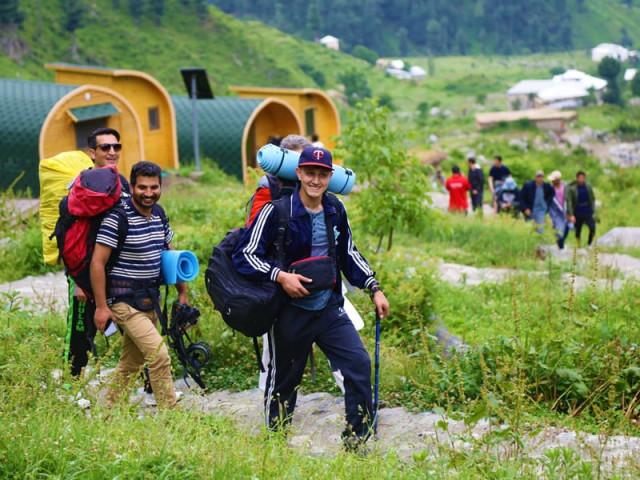US committed to boosting K-P's tourism
Consul general reiterates country's resolve in exclusive interview

Even though terrorism is the most significant challenge currently faced by the province of Khyber-Pakhtunkhwa, the United States sees its immense potential in tourism and others sectors; therefore, reiterating its commitment to the region.
"The province of Khyber-Pakhtunkhwa has immense potential for growth in tourism and sectors, but the security situation remains a significant challenge for the whole country. Regardless, the US is committed to providing all possible support to boosting tourism in the northern province," assures US Consul General Shante Moore during an exclusive conversation with The Express Tribune on Sunday.
Shante Moore shares that he is personally keen on bringing his family to Khyber-Pakhtunkhwa, as it is a region of extraordinary beauty.
He praises the people, culture, and traditions of the province, highlighting their uniqueness and appeal.
While acknowledging that there may be disagreements with US policies, that anti-American sentiment in Pakistan is minimal.
He believes that Pakistan is home to warm people who spread love rather than hatred. "Those who harbor hatred are either uninformed or unaware." Having just completed a year of his tenure as Consul General in Peshawar, Moore remarks that the people he meets are keen on visiting the US. "They are eager to visit the U.S., which reflects their affection rather than animosity towards our country."
"Under his leadership, numerous diplomats have visited Swat and other districts of KP, marking a significant return of diplomatic activity to the region after two decades," he added
Moore also emphasises his positive relationship with religious parties, particularly with JUI-F leaders, including the Mayor of Peshawar and former Governor Ghulam Ali. He mentions that he had multiple meetings with these leaders to discuss the province's development and expressed optimism about future collaborations.
When asked about the rise in terrorism in Khyber-Pakhtunkhwa following the withdrawal of U.S. forces from Afghanistan, Moore expresses his deep sympathy for the families of the soldiers and police officers who have lost their lives in terrorist attacks. He acknowledges their sacrifices, noting that they, too, are fathers, brothers, husbands, and sons.
"The US government, through USAID, has worked extensively to enhance the capabilities of the K-P police and improve security in the region. The International Narcotics and Law Enforcement Affairs (INL) has renovated 430 facilitation centres and transformed 28 police stations into model police stations," he states. "Additionally, women's desks have been established in these stations to facilitate the lodging of complaints."
Moore notes that Pakistan is currently navigating through a phase of democracy, which has lasted 77 years. He compares Pakistan's situation to the early days of democracy in the US, which also faced numerous challenges.
He highlights the internal and external threats faced by Pakistan, emphasising that some of these can stem from neighbouring countries.
Speaking about the province's resources, Moore remarks that K-P is rich in minerals and mines. He mentions that Pakistan was invited to the Mineral Security Partnership Forum, reflecting the importance of this sector.
He stresses the need for further work in hydropower, mineral exploration, agriculture, and other areas, noting that USAID has been actively collaborating with local communities to enhance the capacity of entrepreneurs and launch their products in the market.



















COMMENTS
Comments are moderated and generally will be posted if they are on-topic and not abusive.
For more information, please see our Comments FAQ